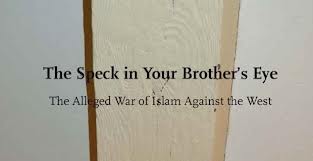The Speck in Your Brother’s Eye – The Alleged War of Islam Against the West – Culture
1 Comment The following quote is unequivocal about where Wilders stands in regard to what can be considered the best possible culture in the world. When discussing Western civilization he states: ‘When you compare the West to any other culture that exists today, it becomes clear that we are the most pluralistic, humane, democratic, and charitable culture on earth’ (p. 31). Specifying his claim he refers to the ‘Judean-Christian civilization’, which he recognizes is ‘no doubt imperfect’ but of which ‘it is unfair to denounce its faults in a historical vacuum’ (p. 31).
The following quote is unequivocal about where Wilders stands in regard to what can be considered the best possible culture in the world. When discussing Western civilization he states: ‘When you compare the West to any other culture that exists today, it becomes clear that we are the most pluralistic, humane, democratic, and charitable culture on earth’ (p. 31). Specifying his claim he refers to the ‘Judean-Christian civilization’, which he recognizes is ‘no doubt imperfect’ but of which ‘it is unfair to denounce its faults in a historical vacuum’ (p. 31).
Wilders claims Western culture is superior to all other cultures by comparison, but fails to specify which other cultures it is supposed to tower over, apart of course from Islam. Not a word on for instance Asian, i.e. Chinese, Japanese or Korean, cultures. And does Western culture include the Balkans, or Russian culture or Christian African culture? I will come back to these questions later in this chapter.
In his chapter five, The Yoke of Ishmael, Wilders makes some interesting remarks on allegedly superior Western culture. Pages 80-85 deal with the creation of the state of Israel and here he explains why he ‘always feel(s) at home in Israel: it is animated by the same spirit that made Western civilization great – that of the soldier protecting the frontier and the pioneer settling the land’ (p. 84). In the lines preceding this sentence Wilders writes: ‘Their (the Jewish settlers’) spirit is the spirit of the West, the spirit of the pioneers who settled America and spilt “their blood … in acquiring lands for their settlement,” as Thomas Jefferson wrote in 1774’ (p. 84). Both quotes refer to violence. They speak of soldiers and of blood that was spilt acquiring lands. This contradicts what Wilders said earlier and which was discussed in the chapter on Truth, namely that the West should be defended with the word and the pen and not with axes and knives, weapons used by Islam. Or do these lines perhaps require a different interpretation? That superior Western civilization established itself using violence, but that once settled the need to use violence disappeared? This suggestion appears to be corroborated by what we read on page 120: ‘Our commitment to truth, human dignity, and a just and honorable defense of the West do not permit us to resort to bloodshed or to give in to despondency.’ Are we supposed to infer from this that the West no longer uses violence?
Some pages later, Wilders discusses the influence of books like the Koran, the Bible and Adolf Hitler’s Mein Kampf. He argues that ‘most people in the West are fair-minded and educated enough that they can’t be incited to commit violence against a group of people just by reading some book’ (p. 122). The West is clearly inhabited by peace-loving people who would never settle their arguments using force. But Wilders is not completely blind. ‘There is,’ he says, ‘a minority of easily impressionable people who can be incited, and this danger is magnified when people believe they are reading a book ordained by God’ (p.122-2, italics Wilders). Here Wilders is talking reality. But does he give examples of such people being misled and using violence? Does he refer at all to the Roman Catholic Inquisition, which, inspired by the Scriptures, burnt apostates by the thousands, or to Protestant convictions that found their way into laws that ultimately led to condemning homosexuals and witches to death? And what about the Christian-inspired anti-Semitism that led to the harassment and persecution of millions of Jews through the ages in virtually all European nations? No, Wilders does not have much more to say than just that ‘the Bible … shaped all of Western civilization’ (p. 123). And indeed, I would say, it did. Wilders’ idea is that the Christian West has led us and is still leading us to peace and any relation with violence is accidental. In the course of history, only a few individuals have resorted to violence inspired by the Bible, but the majority of us Westerners have always been rational, respectful people.
Wilders having thus established the fact that Western civilization is superior and peace-loving, we are not surprised to read the following quote: ‘The West never “harmed” Islam before it harmed us. It was Islam which took the Middle East, Christian Northern Africa and Constantinople by aggressive wars of conquest’ (p. 134). The West was attacked by ‘these aggressive Muslims’ and thus simply had to act. Western civilization would never take the initiative and start ‘aggressive wars of conquest’ itself, now would it? I would like to connect the last quote to the earlier ones, which speak of this Western spirit that made Western civilization great, the blood that was spilt acquiring lands. And where was it that the West acquired lands? Right, in the Americas and Australia. Western explorers travelled the world, ‘discovered’ the New World, and spread their superior Western culture. With the word? With the pen? We know that this was not the case.
The West conquered half the world and depopulated large parts of it through violence and diseases. Levene (2005) gives a shocking account of what happened. The Indians in Northern America, the aboriginals in Australia, the Tasmanians on Tasman Island, all of them underwent the presumed blessings of Western civilization. The Tasmanian people were decimated in less than 80 years after their ‘discovery’. When the British landed on Tasmania in the early 1800s, there were approximately 4,000 to 5,000 people living on the island. In 1876 not a single original inhabitant of the island was left alive, due to Western violence and diseases. Australia as a whole registered a 97% loss of its aboriginal population and Mexico lost ‘some 18,75 million of its number in the period 1520-1524 downwards to a brink of around 1 million in 1605’ (p. 10). Whether we want to acknowledge it or not, the West has committed a worldwide genocide, one of the, conveniently, forgotten genocides of history.
Now Wilders hates cultural relativism, he rejects the idea that all cultures are equal and from this point of view condemns Westerners criticizing their own culture: ‘Westerners who disdain cultural relativism, who are willing to denounce barbarism when they see it, and who believe that the West, indeed, is the centerpoint of civilization today, are dismissed as haters (p. 135).’ But criticizing one’s own culture does not mean rejecting one’s own culture. I would consider it a sign of strength to be willing to acknowledge the weaknesses of one’s own culture. In fact, those who do so should be praised by Wilders as he strongly suggests that Muslims should do the same: ‘What is needed in Islamic countries is not a change in leadership, but for Muslims themselves to renounce Islam and liberate themselves from the ideology’s mental prison’ (p. 209). This goes very far indeed: Wilders suggests that Muslims should give up their religion, which, of course, is unacceptable to them. I will come back to this suggestion in the last chapter of this book. But if we were well disposed towards the intention behind this advice, we could conclude from it that he considers self-criticism to be a good thing. Why then would this not apply to the bearers of the best civilization on earth?
A regrettable aspect of Wilders’ claim that Western culture and civilization are the best in the world today is that it is hardly ever mentioned as an independent statement. It is virtually always mentioned in comparison with the perceived evil nature of Islam. On pages 80-82, Wilders, as I mentioned before, deals with the creation of the state of Israel. He reports on the migration to Israel of Jewish communities living in Arab countries after it was founded in 1948. He labels them refugees and states that ‘(N)o one talks about the Jewish refugees anymore because they quickly made new lives for themselves in Israel, Europe and America, even though many of them had arrived penniless’ (p. 82).
Wilders wants to make it clear that there is no point in dwelling on the past. His motto is ‘Look to the future.’ He also mentions ‘the Germans who were expelled from the Sudetenland and the lands east of the Oder and the Neisse rivers, the Greeks who were expelled from the Aegean coasts of Anatolia’ and other such cases. All of these people let bygones be bygones and got on with their lives. Islamic and Arab countries, on the other hand, are eternally, it seems, postponing a solution to the issue of the Palestinian refugees of 1948 and 1967. What keeps them from permanently settling down and getting integrated in countries like Lebanon, Syria and Jordan? Why do these governments refuse to settle things, like the Jews once did, and the Germans and the Greeks?
Well, this, Wilders observes, has to do with ‘a strong characteristic of Islam: it nurtures resentment, passing it on from generation to generation’ (p. 82). ‘Islam’, he continues, ‘still complains about the Crusades, as if France would still moan about the Hundred Years’ War…’ (p. 82). I would agree that at some point one has to come to terms with the past, one has to stop brooding over it; one has to look to the future, however difficult that may be. But is this mentality of being prepared to leave things behind you, forgetting about the past, letting bygones be bygones, a specifically Western characteristic? Does it mean that the West is not suffering from any kind of memory syndrome?
28 June 1389 is the date of the Kosovo Battle, which took place near Kosovo Polje, Black Bird’s Field, where Serbian warriors were slain by Ottoman armies. This battle has been commemorated each year ever since, right to this day. In 1914, it was on this specific day that the heir to the Austria-Hungarian throne, Grand Duke Franz-Ferdinand, was killed by Serbian terrorist Gavrilo Princip, which eventually led to the outbreak of the First World War. In a speech in Kosovo Polje in 1987, then leader of Serbia, Slobodan Milošević, proclaimed that no one had the right ‘to beat up’ the Serbian part of the population in Kosovo, which at the time was dominantly inhabited by -Muslim- ethnic Albanians. The Serbs in Kosovo complained about the abuse they were forced to undergo from the Muslim majority.
It was this speech that later marked the start of the Kosovo war in 1999. Apparently, people from the Balkans do not forget. Particularly when it comes to battles with Muslims, even when these go back as far as 1389. Are the Muslims to blame then for the 1999 war? Who caused the Muslim population of Kosovo to flee in 1999? Was it not Mr. Milošević’s ‘Christian’ Serbian armies? And are we to conclude that the Eastern Orthodox Balkans, having such a hard time forgetting about the past, are not part of Western civilization? That Western civilization consists solely of countries like, say, the United States, Britain, France and Germany?
And supposing the inhabitants of these countries are so good at forgiving and forgetting, what about the German people who once lived in what is now Western Poland and the former Sudetenland. Are they at peace with what happened to them right after the Second World War? How come there are numerous associations whose members long for the days when their ancestors were still living in these regions? How come the Scottish people still cherish sentiments of independence from the English? Why do they not simply accept the fact that they are part of the United Kingdom? An even more telling example is the tragedy of Northern Ireland. Why did it take so long before the people of Northern Ireland and the Irish Republic accepted the partitioning of the island in 1922? Is it not another example that flatly contradicts this presumed Western spirit of forgetting about the past and moving on, as it took 30 years of bloodshed and more than 3,000 dead before finally a fragile balanced peace was established? And what about the continuous battle going on between the Basks and the Spanish authorities? Why do they not settle their dispute in the ‘go-for-it’ spirit of the West?
And am I mistaken in sensing perhaps a wee bit of resentment when reading on page 134 of Wilders’ book that ‘the West never “harmed” Islam before it harmed us’ and that it was ‘Islam which took the Middle East, Christian Northern Africa and Constantinople by aggressive wars of conquest?’ The Middle East, Christian Northern Africa and Constantinople belonged to us, to the civilized West. And they, the aggressive Muslims, took them from us. But this happened more than a thousand (Northern Africa and the Middle East) or more than 500 (Constantinople) years ago!
Is it not about time to forgive and forget, which after all we are so good at? Wilders’ Party ideologue, Mr. Bosma, in his book that I mentioned before, argues that the fall of Constantinople in 1453 was the incentive to establish the forerunner of what is now the Dutch Parliament. He recalls that with the entrance of the Freedom Party into the Dutch Parliament in 2006, the Parliament’s original mission had been restored: the fight against Islam. This interpretation of history, apart from it being highly contestable, does it not contradict this Western spirit of forgetting the past and moving on?
Let me give another example of the perceived superiority of Western civilization. In his chapter four, Wilders talks about a trip he once made to the Middle East and how he became ‘fascinated by the decorative splendor of a copy of the Koran that was for sale’ (p. 58). He bought the book, took it home, read a translation of it and was utterly disappointed. ‘I expected to find injunctions to “love thy neighbor” and other commandments similar to those in the Bible, but instead I found the spite of a god who hates’ (p. 58). In these same pages, he describes how tolerant Jews and Christians are with regard to adulterous women, quoting Jesus who said: ‘He that is without sin among you, let him cast the first stone’ (p. 59, John 8:7). Muslims, by contrast, still stone adulterous women to this day. Now, I do not contend that in some Islamic regions women are indeed stoned. Every single woman stoned is one too many. But the stoning of adulterous women is not a general practice in the whole Islamic world. On the contrary, most Islamic countries abhor stoning. The implicit message though, that Christianity only preaches love and an absence of violence is an overstatement. True, the key message of the Bible is to love thy neighbor as thyself, but unfortunately there are many other verses in the Bible that have incited individual people, religious institutions and entire states to use violence. An example of an individual inspired by the Bible to commit atrocities is Norwegian mass murderer Anders Behring Breivik, who killed 77 people on a mission that was inspired by the words of Jesus. In his 2083 European Declaration of Independence he declares the following in his section 3.149:
‘….in the New Testament, Jesus commanded His disciples to buy themselves (swords) and equip themselves. ‘
Luke 22:36: ‘Then said he unto them, “But now, he that hath a purse, let him take it, and likewise his scrip: and he that hath no sword, let him sell his garment, and buy one”’.
Matthew 26:52-54: ‘Then said Jesus unto him, “Put up again thy sword into his place: for all they that take the sword shall perish with the sword. Thinkest thou that I cannot now pray to my Father, and he shall presently give me more than twelve legions of angels? But how then shall the scriptures be fulfilled, that thus it must be?”’
If you read those verses in context they support the position of self-defense. Jesus told Peter it would be committing suicide to choose a fight in this situation, as well as undermining God’s plan to allow Jesus’ death on the cross and resurrection. Jesus told Peter to put his sword in its place – at his side. He didn’t say ‘throw it away’. After all, He had just ordered the disciples to arm themselves. The reason for the arms was obviously to protect the lives of the disciples, not the life of the Son of God. What Jesus was saying was: “Peter, this is not the right time for a fight.”
In the context of cultural conservative Europeans current war against the cultural Marxist/multiculturalist elites and the ongoing Islamic invasion through Islamic demographic warfare against Europe, every military action against our enemies is considered self defense. There will be much suffering and destruction but eventually we will succeed and may be able to start rebuilding’.
Wilders and his party have repeatedly stated that they consider Mr. Breivik to be a lone wolf, a lunatic, a psychopath who represents only himself. Wilders denied any link with Mr. Breivik’s thinking and the latter’s violent interpretation of the Scriptures. Still, Mr. Breivik can be considered one of the few exceptions whose existence Wilders does not deny when he writes that there is this small minority in the West that is seduced to use violence after reading a book, in this case the Bible. Let us leave aside deranged individuals, and take a closer look at what history tells us. The Thirty Years’ War (1618-1648) in Central Europe, largely characterized as a religious war between Catholics and Protestants, led to enormous losses in the population with estimates for Germany of 25 to 40 percent. The Eighty Years’ War (1568-1648) between Catholic Spain and the predominantly Protestant Netherlands, apart from being a struggle for independence, was a religious war as well. More recently we have seen the complex conflict in Northern Ireland between Protestants and Catholics taking a death toll of more than 3,000 persons.
Teachings in the Bible lead to verbal violence and occasionally to physical harm as well. What are we to think of the Westboro Baptist Church in the United States, for example, which, basing itself on the Bible, states that God hates all homosexuals and that they will go to hell? Maybe the following example is more telling. Why do women still die as a result of illegal abortions in Catholic countries like Poland and Ireland? Why do these countries deny women the right to control their own bodies and the life they carry? Is it not the strong pressure and influence of the Catholic Church that is to blame for that? And what about African Anglican Churches who condemn homosexuality as a Western invention, as a result of which African gay people risk losing their lives when they venture to come out? Or are African Anglicans perhaps not part of superior Western culture?
It is true, Christianity ordains its believers to love their brothers and sisters. But it is equally true that Islam preaches a merciful God. In 2005 I published a collection of essays on what I called The Statistics of Religions. Essays on the Judaic-Islamic-Christian Tradition of our Country. In it I reported on my counting the number of occurrences of certain words in the Bible and the Koran. The Koran far outnumbered the Bible, both in absolute and in relative terms, in the number of times the words ‘mercy’, ‘forgive’ and ‘forgiver’ were mentioned. The word ‘war’ occurred far more frequently in the Bible than in the Koran. The bottom line is that both Scriptures can be and should be interpreted as books of peace and love and mercy, but equally that both contain verses and words that are less peace-loving, and that the reality is that there are interpreters that choose to focus on the dark side of both books.
Am I showing myself to be a reprehensible cultural relativist here? Undoubtedly. But I do wish to underline that I do not want to do away with religions, Christianity or otherwise. Religions promote worthy human values and they should continue doing that. Religions, however, should also abide by the dogma that it is God who punishes or rewards, not people. Religious people should strive for a happy afterlife, while at the same time respecting those who do not believe in such ideals. Many Christians walk the path of non-violence, as do many Muslims. But history shows us that both religions have very dark pages in their histories and the challenge for them is to make violence-free religion a reality. In fact, religions have an advantage over ideologies which seek to establish paradise here on earth, and which have cost millions of lives. I will go into this matter in the next chapter. For the moment, I must conclude that the arguments that Wilders adduces for the superiority of Western culture can be countered by equally strong arguments to the contrary. As always: the truth lies somewhere in the middle. Reality is neither black nor white.
Next Chapter: http://rozenbergquarterly.com/?p=4800
You May Also Like
Comments
One Response to “The Speck in Your Brother’s Eye – The Alleged War of Islam Against the West – Culture”
Leave a Reply









April 11th, 2013 @ 6:24 am
[…] One – Wartime Chapter Two – Truth Chapter Three – Culture Chapter Four – Ideology Chapter Five – Solution Chapter Six – The Speck In Your […]